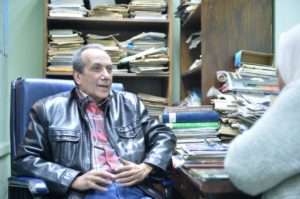By: Nour Elhoda Fouad, Yassmine ElSayed
CAIRO, Mar. 9 (SEE) – 100 years passed since Egypt’s 1919 Revolution. 100 years and its political, social, economic and cultural repercussions are still under study and assessment. So, SEE presents new aspects for the inspiring revolution..
100 years passed since the historical 1919 revolution in Egypt.. The revolution was full of lessons. Prominent Journalist and Historian Rashad Kamel talked to ‘SEE’ about this revolution. He stressed that the revolt had great historical moments, and caused cultural, artistic and economic changes, in addition to its main purposes- independence and increasing Egyptian influence.


Kamel told ‘SEE’ that the 1919 revolution had many mistakes, despite its great results though. “Perhaps the main mistake is the split and pision among its leaders, which was followed by a same pision among the people,” he explained. "They disagreed about whether to negotiate with occupying England or not."

He added: “Saad Zaghloul, the icon of the revolution, was denounced by the opposition who said ‘he is a traitor’ because he sat with the occupier in a friendly and peaceful manner."
Zaghloul negotiated for the little as a beginning for greater gains – to eventually achieve real state sovereignty- an ultimate goal of all political leaders since 1880s until the 1952 revolution.

Kamel added that after Zaghloul went to the British ruler, along with his friends Ali Shaarawi and Abdul Aziz Pasha Fahmi, saying that Egypt supported UK during WWI, and that she waits then for her independence as UK promised.. He was asked in return: “Who are you to talk for the Egyptian people?”. Then a whole campaign started to collect permissive signatures for Zaghloul and his colleagues. Egyptians, all over the country, classes, age groups, signed, even the illiterates posted their finger stamps.
Back then, there were atrocities done by the occupying English. Attacks were targeting Jewish temples and portrayed as done by Muslims.. Also mosques were attacked and Christians were portrayed as the culprits.. However, Egyptians were not naive to take this in. they formed public committees to guard those worshiping places.
The prominent historian recalled a certain trait of the Egyptian personality, which is to support a leader, inspirer or savior. They did that while Zaghloul, though was aging, was enjoying the support of the vast majority of Egyptians, who described him as the hope of the nation.
Kamel said later on, Zaghloul was able to obtain the permit of February 28, what we considered a semi-independence, with the presence of British troops on the borders of the Suez Canal after the completion of WWI by that time. We had then Sultan, who was King Ahmed Fouad, and a Constitution of 1923, the greatest in Egyptian history, as well as a cabinet independent from British intervention or even the king’s. For the first time we had separation of powers (between the government and the King), where a legal expert from Austria was in charge of this separation.
Revolutions often have enthusiastic starts, as by the time ‘Wafd’ Party assumed power in 1923 (until 1930), Egypt witnessed a comprehensive development, including the economic field.
“It was one of the most important gains of the revolution, when the economic icon Talaat Harb, unprecedentedly, called the Egyptians to take part in an IPO to establish ‘Bank Misr’, an idea known then for 20 years, but failed to come into effect, but only after the revolution," Kamel said
And since the national unity is an essential characteristic of Egyptian society, Jews then (were about 80,000 persons) took part in the cabinet.
When Harb established Bank Misr, 3 Jews were among its board. This time also was special in Egypt’s history as it was the first time for women started to participate in public life; they took part in the demonstrations that happened at that time against British occupation.
As for the state of the press, Kamel said that in June 1930, King Fouad discharged the cabinet of Mustafa al-Nahhas, a prominent politician and one of the leading businessmen in Egypt, and authorized Ismail Sedki to form a new cabinet. Sedki agreed but with conditions to rewrite the constitution since freedom of speech was beyond its scope. Once taking office, he dissolved the parliament and suppress journalists.
He stayed in power for three years, during which Egypt witnessed great economic and industrial achievements. He wrote in his memoirs that he was planning for an economic renaissance, and that the battles with the press was time wasting.
The opposition was issuing newspapers that ridiculed him, for example when he established the Corniche of Alexandria. The opposition were accusing him of giving the project contract to a Jewish person because he had an affair with his wife.






